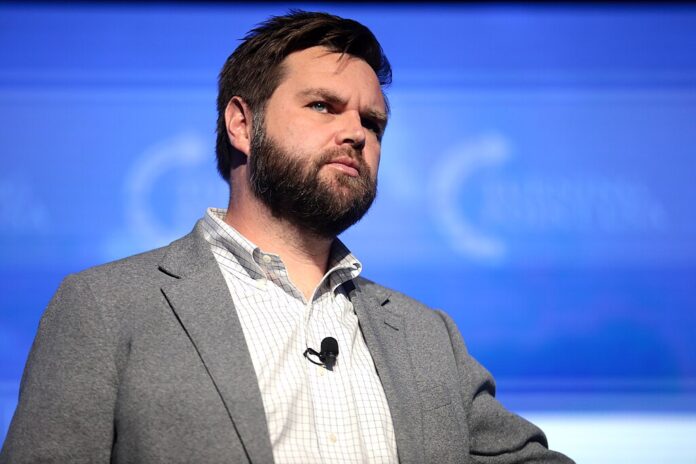The only scheduled vice presidential debate will feature Minnesota Governor Tim Walz and Ohio Senator JD Vance as they vie for voters’ attention ahead of the November election
As the November election approaches, all eyes are set on the upcoming vice presidential debate between Minnesota Governor Tim Walz and Ohio Senator JD Vance. Scheduled for Tuesday at 9 p.m. ET, this debate is the only one before voters cast their ballots. It comes just three weeks after the highly publicized debate between former President Donald Trump and Vice President Kamala Harris.
Tim Walz, who is Harris’s running mate, has been a significant figure in Minnesota politics, yet he remains relatively unknown to many voters outside his home state. With a long political career that includes serving as a U.S. Representative, Walz is now stepping into the national spotlight, ready to present his vision alongside Harris.
In contrast, JD Vance is a newcomer to the political arena, having been elected to the Senate in 2022. Known for his bestselling memoir, Hillbilly Elegy, Vance quickly gained national attention and was selected by Trump as his running mate, bringing a fresh perspective to the ticket.
Embed from Getty ImagesThe debate will take place at the CBS Broadcast Center in New York City, a city with deep connections to Trump, who previously resided there. Despite his move to Florida, Trump remains optimistic about his chances in New York, famously stating, “I can win New York, and we can win New York.”
The format of the debate has been carefully structured. It will last 90 minutes, mirroring the length of the presidential debates, and will feature two four-minute commercial breaks, during which candidates are not allowed to interact with their campaign staff. Notably, the event will be conducted without an audience, a continuation of the format used in the presidential debates.
Moderating the debate will be CBS Evening News anchor Norah O’Donnell and Face the Nation host Margaret Brennan, both experienced journalists ready to guide the discussion. At the start of the debate, Walz will be introduced first, followed by Vance. Each candidate will have two minutes to respond to questions, along with one minute for rebuttals and the potential for additional discussion time at the moderators’ discretion.
Candidates are prohibited from bringing pre-written notes or props to the stage, emphasizing the importance of on-the-spot thinking and spontaneity. A virtual coin toss determined that Vance would give his closing statement second, with each candidate allotted two minutes for final remarks.
Both campaigns will face the challenge of navigating a debate without advance knowledge of the topics or questions, ensuring a fresh and dynamic discussion.
For those wishing to tune in, CBS will begin airing coverage at 8 p.m. ET on its broadcast stations and affiliates. The debate will also be accessible for streaming on the free CBS News app, Paramount+, and various platforms where CBS News 24/7 is available, including CBSNews.com and YouTube.
Analysis:
Political Perspective: The vice presidential debate between Tim Walz and JD Vance represents a crucial moment for both candidates to assert their positions in a highly polarized political climate. With the election just weeks away, this debate offers an opportunity for Walz to connect with voters beyond Minnesota, leveraging his experience in state politics to appeal to a broader audience. For Vance, who aligns closely with Trump’s policies, the debate is a chance to solidify his standing as a rising star in the Republican Party and capitalize on any weaknesses in the Democratic ticket.
Social Perspective: This debate underscores the growing importance of social media and grassroots movements in shaping political narratives. Voters increasingly turn to online platforms to engage with candidates and issues, making it essential for both Walz and Vance to communicate effectively and resonate with diverse demographics. The absence of a live audience during the debate could further shift the dynamics, focusing attention on the candidates’ performances rather than crowd reactions, thereby allowing for a more direct dialogue with viewers at home.
Racial Perspective: The 2024 election cycle has seen an increased emphasis on racial issues, particularly as they pertain to policy and governance. Walz’s history of advocating for inclusive policies may resonate with voters concerned about equity and representation. Meanwhile, Vance’s background and perspectives on socioeconomic issues, shaped by his upbringing, will be critical in addressing the concerns of diverse communities. Both candidates must navigate these complexities to build coalitions that reflect the electorate’s varied interests.
Gender Perspective: The dynamics of gender in the 2024 election are particularly noteworthy, especially with Kamala Harris as the current Vice President and the first female VP in U.S. history. As Walz represents the Democratic ticket, he must not only support Harris but also appeal to female voters who may prioritize gender issues. Vance, meanwhile, will need to address how his policies align with the needs of women, particularly in areas such as healthcare, family leave, and workplace equality.
Economic Perspective: The state of the economy is a pressing issue in the upcoming election, with voters concerned about inflation, job growth, and economic recovery. Both candidates will have to articulate their economic visions clearly during the debate. Walz may highlight progressive policies aimed at addressing income inequality and investing in infrastructure, while Vance could emphasize tax cuts and deregulation as means to spur economic growth. Their differing approaches to economic policy could play a significant role in shaping voters’ decisions in the lead-up to the election.
